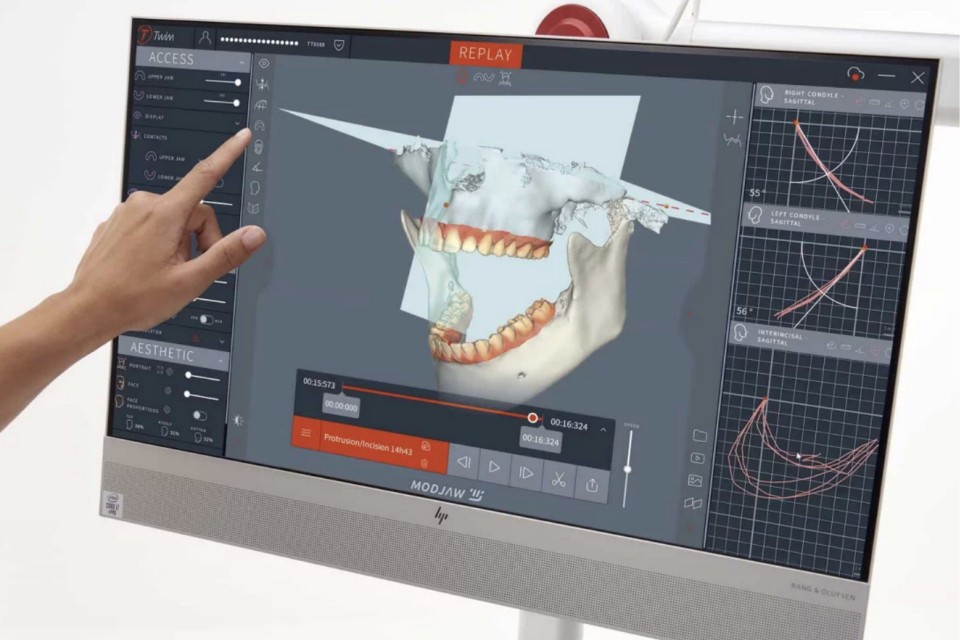
Do you experience discomfort when chewing or persistent pain? You could be experiencing a TMJ disorder in Barcelona. We are temporomandibular joint specialists. At Clínicas Den, we offer advanced and personalized treatments to restore comfort when chewing, speaking, or smiling.
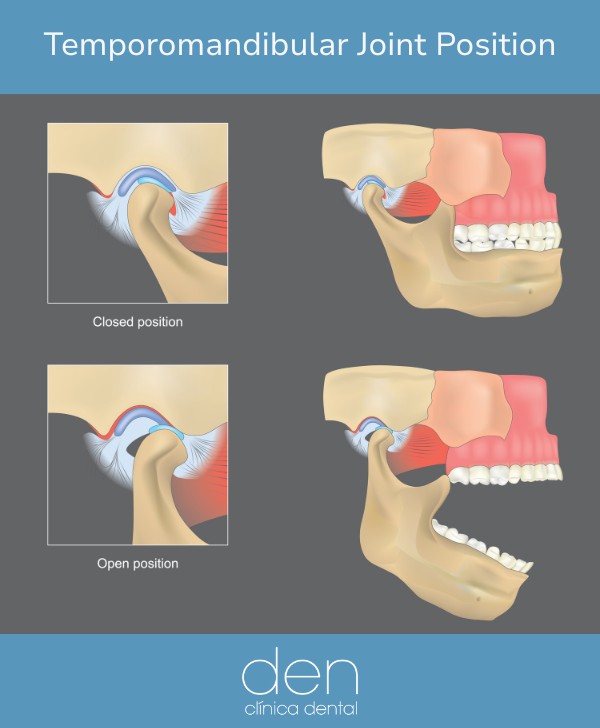
TMJ in Barcelona
The temporomandibular joint connects the jaw to the skull, just in front of the ear. Thanks to it, we can speak, chew, and open our mouth normally.
It’s a delicate area. It’s estimated that 70% of the population may suffer some type of dysfunction in this joint throughout their lives.
Is this your case? At Clínicas Den, we address TMJ disorders with a comprehensive and personalized approach, combining advanced technology and dental experience to restore your quality of life.

Temporomandibular Joint Specialists in Barcelona
Doctors Alberto Canábez and Pablo Rial, along with their team at Clínicas Den, specialize in the treatment of TMJ disorders in Barcelona. Using a comprehensive approach, their goal is to restore the jaw’s natural balance and function to improve chewing and reduce joint tension.
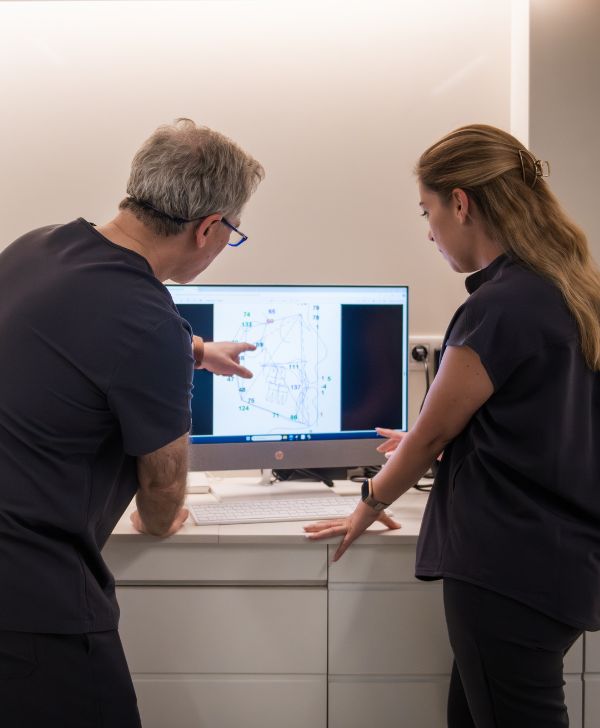
Most common causes of TMJ disorders
Temporomandibular joint problems and disorders are multifactorial. Identifying the cause is key to applying the appropriate treatments for each case. Common causes:
- Decay or missing teeth.
- Malocclusion or dental misalignment.
- Bruxism (teeth grinding or clenching).
- Stress or emotional tension, which causes muscle overload.
- Trauma or blows to the face.
- Bad habits, such as nail biting or chewing on only one side.
- Alterations in bone or muscle development.
- Genetic or rheumatic factors.
We thoroughly evaluate each case to find the specific cause and treat it with the most effective approach.
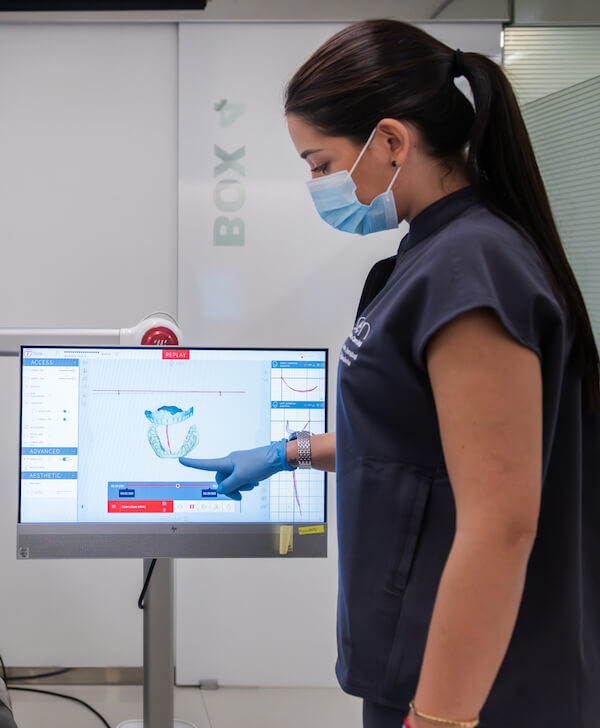
Advanced technology for accurate diagnosis
We are committed to advanced and personalized diagnosis to address temporomandibular joint disorders in Barcelona:
-
- Detailed clinical interview: where the doctor analyzes the patient’s symptoms, medical history, and habits.
- Jaw examination: to study dental occlusion and detect functional limitations, noises, or deviations.
- Advanced digital testing: CBCT three-dimensional radiography, 3D intraoral scanner, and Modjaw 4D real-time mandibular movement recording.
- Digital and multidisciplinary planning: where various specialists collaborate to design a comprehensive and precise treatment.
This protocol allows for an in-depth analysis of joint function and the design of a personalized and precise treatment.
Temporomandibular joint treatments in Barcelona
We approach temporomandibular joint disorders with a comprehensive and personalized approach, combining various dental techniques. Our treatments aim to restore the functionality and stability of the bite, taking into account the balance of the entire masticatory system: muscles, teeth, gums, and joints.
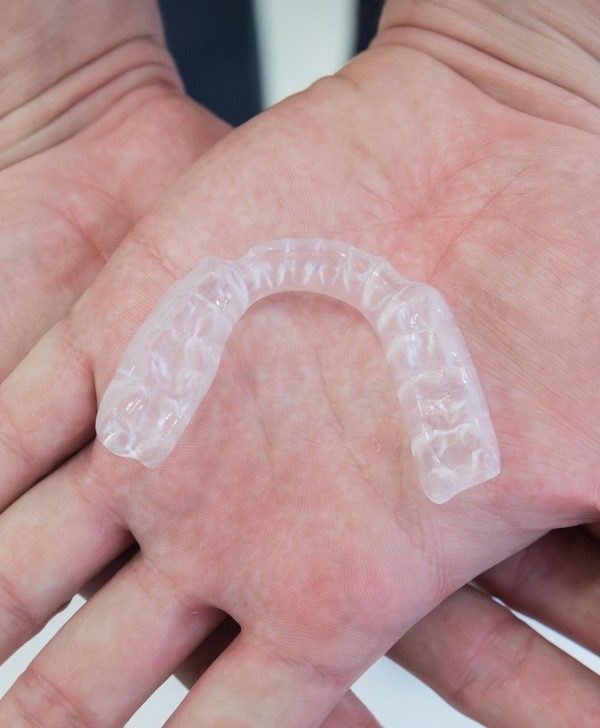
Discharge and deprogramming splints
Offset Splint: This is a rigid, transparent, custom-made dental sheath placed over the teeth to relax the jaw joint, reduce bruxism, and relieve muscle or joint pain caused by a forced malocclusion.
Deprogramming Splint: This is a temporary device that helps relax the jaw muscles and stabilize mandibular function. It is used in cases of TMJ dysfunction to achieve rehabilitation of occlusal movement.
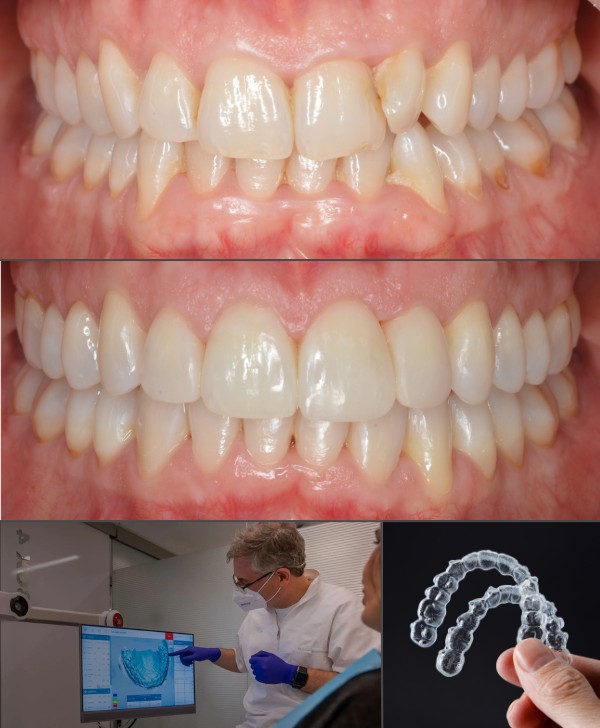
Orthodontics and functional occlusion
When TMJ dysfunction is related to a malocclusion (the way the teeth fit together when biting) or improper tooth distribution, we work from the root cause.
Thanks to real-time jaw movement analysis (Modjaw 4D), we design a personalized treatment that combines deprogramming splints and invisible orthodontics.
This multidisciplinary approach corrects the position of the teeth to balance the bite, improve jaw function, and reduce joint overload. The result: a more stable, functional jaw free of joint discomfort.
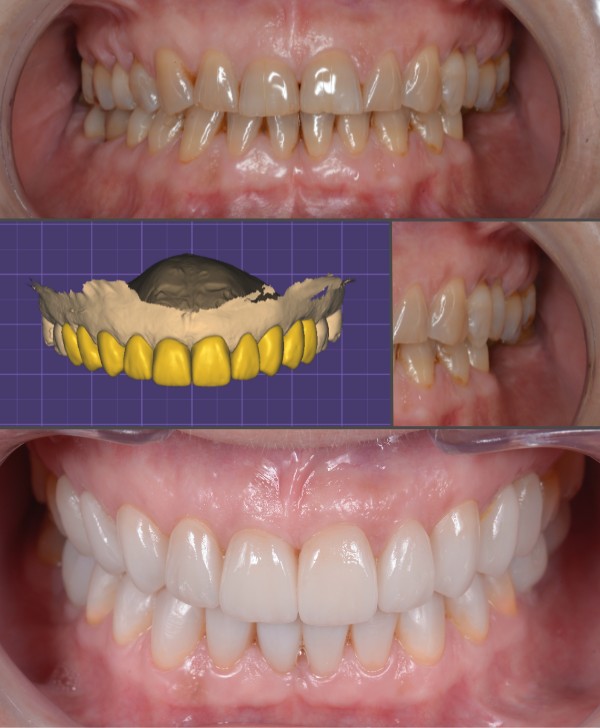
Oral and dental rehabilitation
Crowns, bridges, and dentures are key when temporomandibular joint disorders are associated with worn or missing teeth.
This oral rehabilitation restores aesthetics, but above all, it restores jaw function, improving the bite and reducing joint stress.
At our dental clinic in Barcelona, we also work with biocompatible dental implants, which integrate securely into the jawbone and provide a natural feeling in the mouth.
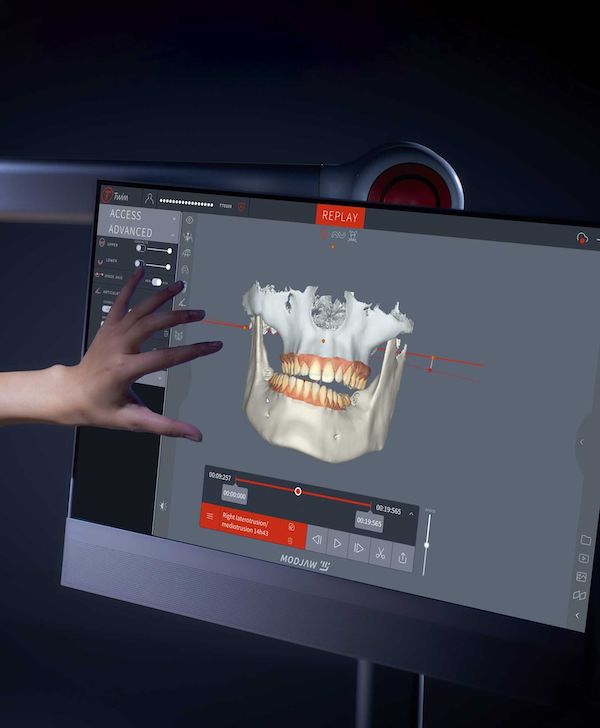
Surgeries for TMJ disorders in Barcelona
At Clínicas Den, we treat TMJ disorders in Barcelona with conservative treatments, although in very complex cases, surgery may be necessary.
The most common surgical options include arthrocentesis (minimally invasive joint lavage), arthroscopy, or, in advanced cases, orthognathic surgery, when there is a structural alteration that affects the position of the jaws and the function of the TMJ.
To address these cases more precisely, we have Dr. Ramón Sieira Gil, an oral and maxillofacial surgeon specializing in orthognathic surgery and facial reconstruction.
Why choose us to treat your TMJ disorder?
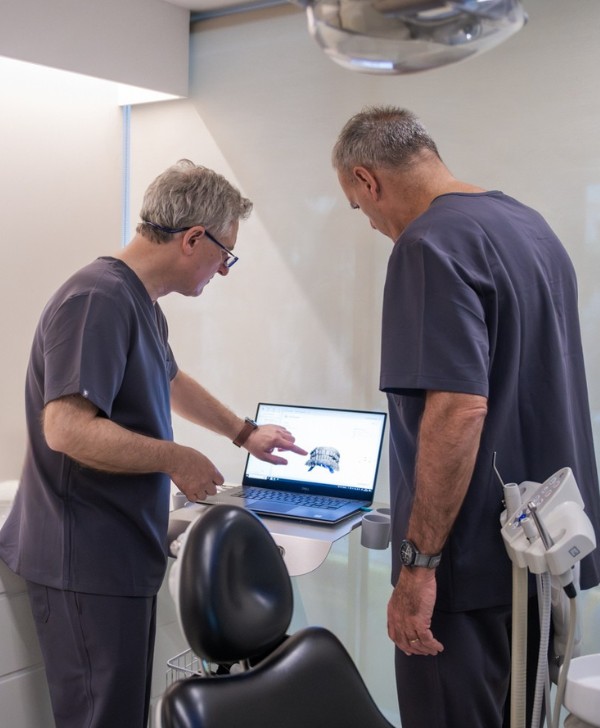
At Clínicas Den, we have a multidisciplinary team of professionals specialized in the diagnosis and treatment of temporomandibular joint (TMJ) disorders.
El Dr. Alberto Canábez and Dr. Pablo Rial, medical directors of our clinic in Barcelona, combine 25 years of dental experience with advanced training in orthodontics, functional occlusion, and oral and dental rehabilitation.
We apply a fully personalized approach, supported by cutting-edge technology and highly accurate digital diagnostic protocols. Our priority is to offer effective treatments tailored to each patient.
Frequently asked questions about the temporomandibular joint (TMJ) in Barcelona
What is the temporomandibular joint (TMJ)?
The temporomandibular joint is the structure that connects the jaw to the skull (upper jaw to lower jaw), allowing movements such as opening and closing the mouth, chewing, speaking, and gesturing. The TMJ is one of the most complex joints, as it is essential for oral function and facial harmony.
What are the most common symptoms?
Symptoms can vary from person to person, but some of the most common include pain in the jaw, face, neck, or ears. You may also experience difficulty chewing, clicking when opening or closing your mouth, limited jaw movement, and frequent headaches.
Could I have TMJ disorder and not know it?
Yes. Some patients experience mild or intermittent symptoms such as jaw fatigue, headaches, or joint noises that often go unnoticed. A diagnostic study helps detect temporomandibular joint disorders before symptoms worsen.
Is it normal to have clicking sounds when opening your mouth?
Not always. An occasional small clicking noise may not be worrisome, but if it’s repetitive or accompanied by pain and difficulty opening the mouth, a functional evaluation of the joint is recommended.
Is there a definitive treatment for jaw and joint pain?
In many cases, yes. With an accurate diagnosis and well-planned treatment, symptoms can disappear completely or improve significantly. However, each case requires a personalized analysis and approach.
Does bruxism always affect the joint?
Not necessarily, but it is a significant risk factor. Constantly grinding or clenching your teeth puts strain on the TMJ, which, over time, can lead to wear, inflammation, or dysfunction.
Is surgery always necessary?
No. Most cases are resolved with conservative treatments such as splints, orthodontics, or oral rehabilitation. Only in very complex and advanced cases is surgical intervention considered.
What treatments are available for these TMJ disorders?
At our dental clinic, we offer a comprehensive approach to TMJ disorders, which may include:
Occlusal splints:
Offset splint or jaw deprogramming splint.
Occlusal rehabilitation:
Bite adjustment to help teeth fit together and reduce joint strain.
Orthodontics:
For dental alignment, bite balance, and improved chewing function.
Dental rehabilitation:
Implants, dentures, crowns, or veneers improve jaw function if teeth are worn or missing.
Physiotherapy:
Relaxing massages and muscle-strengthening exercises.
Pharmacological:
Use of muscle relaxants or anti-inflammatories to relieve pain and muscle tension.
Lifestyle changes:
Reducing stress, avoiding hard foods, and improving chewing posture.
Surgery:
Only in very complex and specific cases, when other treatments have not been effective.
How long do the treatments last and when will I see results?
The length of treatment will vary depending on the severity of the condition, and the time it will take to see results depends on each patient’s response. Some may begin to feel relief within a few weeks, while others may require longer treatment.
During your initial consultation, we will provide you with a detailed treatment plan and explain what to expect.
Are the treatments painful?
Most treatments are minimally invasive and do not cause significant pain. Some techniques may cause slight discomfort at first, but this is usually temporary. Our team ensures that you are comfortable throughout the entire process.
What can I do at home to relieve my symptoms?
You can apply hot or cold compresses, avoid hard or sticky foods, do gentle jaw stretching exercises, and try to reduce stress with relaxation techniques.
However, it’s very important to speak with a specialist to get a diagnosis and a treatment plan tailored to your needs.
Patient testimony with TMJ disorder
Reviews of our Dental Clinic in Barcelona
Tell us how we can help you
+34 932 18 80 80
Request an appointment with our MTJ specialists in Barcelona
Fill out the following contact form to contact our clinic and request more information about our treatments or schedule an appointment with our specialists.




